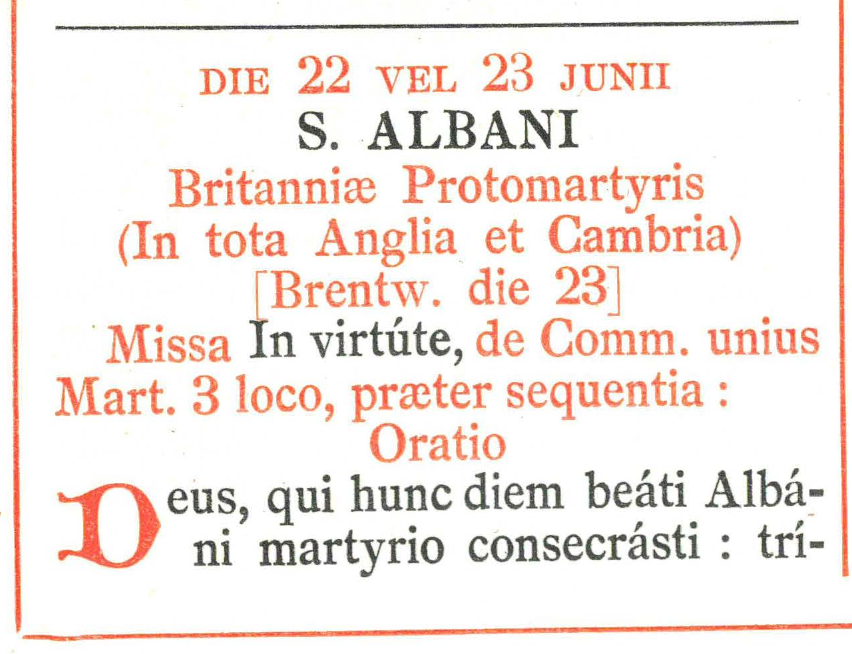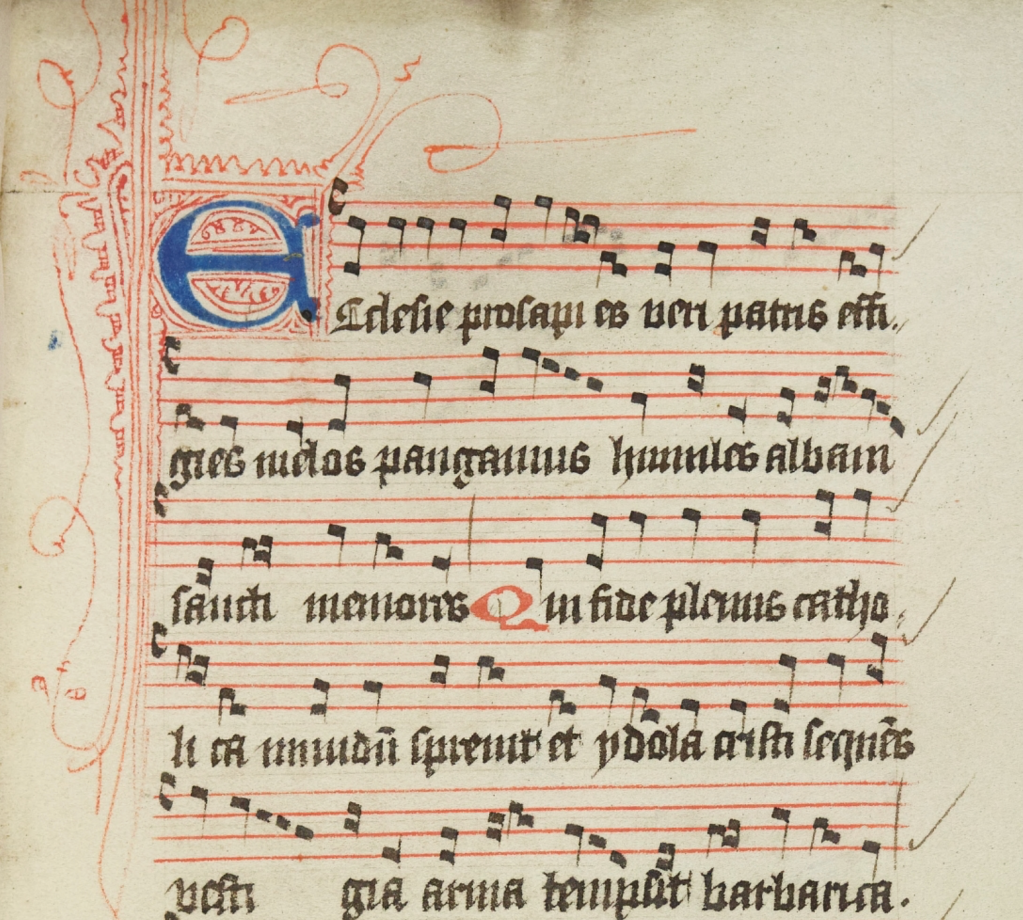From the Miniature Lives Of The Saints, For Every Day In The Year, Henry Sebastian Bowden, 1836-1919. This is from the first volume that does not appear to be online.
Alban was a citizen of Verulam ; a man of distinction, who, himself a pagan, had been to Rome in quest of knowledge. When the last great persecution, under Diocletian, broke out, Alban sheltered in his house a priest who was fleeing from his enemies. He was so affected by the piety of his guest that he eagerly received his teaching and became a Christian. In a few days it was known that the priest lay concealed in Alban’s house, and soldiers were sent to seize him. Thereupon Alban put on the priest’s garments, and gave himself up to the soldiers in his stead. The judge was irritated at the escape of the priest, and threatened Alban with the extremest torments if he persisted in forsaking the false gods of Rome. The Saint replied firmly that he was a Christian, and would not burn incense to the gods ; and was condemned to be first tortured, and then beheaded. As he was led to the place of execution, an eminence outside of the town, a miracle wrought by the Saint so touched the heart of the executioner that he flung down his sword, threw himself at Alban’s feet, avowing himself a Christian, and begging to suffer either for him or with him. Other miracles marked the death of the protomartyr of England. When the persecution ceased a church was built on the spot ; and later on, the noble abbey of S. Alban’s was founded by King Offa.
Perfect Charity
‘The greatness of our love of God must be tested,’ said S. Philip Neri, ‘by the desire we have of suffering for His love.’
‘Our Lord has said, “Love one another, as I have loved you.” This means that, as Jesus has always preferred us to Himself, and still does so when He gives Himself to us in the most Holy Sacrament, so it is His will that we should always prefer others to ourselves.’ – S. Francis of Sales.
When Alban was brought before the judge, he was asked, ‘Of what family are you?’ The Saint answered, “That is a matter of little concern : know that I am a Christian.’ The judge persisted ; and the Saint said, ‘I was called Alban by my parents, and I constantly adore and worship the living and true God who created all things.’ Then the judge said, ‘If you wish to enjoy the blessedness of eternal life, delay not to sacrifice to the great gods.’ Alban replied, ‘These sacrifices are offered to demons, and can bring no help, or answer to the desire of the heart. They who offer them receive as reward the undying punishment of hell.’
‘In this we have known the charity of God, because He hath laid down His life for us : and we ought to lay down our lives for the brethren.’ – 1. John iii. 16.
An account of the death of St. Alban can be found in The Camp on the Severn, A.D. Crake one of a number of historical fiction novels covering the history of the Church.
Below are UVOC style Propers sheets, with the Proper texts of the Mass in Latin and English from the St Andrew daily Missal.
In the Analecta Hymnica Vol. 11, pg. 67 we have Hymns for our Saint, the first Ecclesiae prosapies, is from the 12th c. and is also found in a 15th c. Hymnal from Barking abbey Essex, a former Benedictine nunnery. This Manuscript can be found in the Trinity College Library Manuscript Catalogue (Cambridge) and has been scanned and can be found here, Manuscript O.3.54. It should be noted that the manuscript has a melody that is not notated cosistently, we have produced a version with a consistent notation. The second Hymn Ecce votiva recoluntur festa, is from Brev. Othinense imp. Lubecae (Lübeck) A.D. 1497. We have set it to a melody from the Sarum books.
- Ecclesiae prosapies, 15th c. Hymn. from Barking Abbey
- Ecclesiae prosapies, 15th c. Hymn. from Barking Abbey (modified melody)
- Ecclesiae prosapies, 12th c. Hymn. (Melody from the Sarum Antiphonal)
- Ecce votiva recoluntur festa, c. A.D. 1497 (Melody from the Sarum Antiphonal)
The Sarum Office for St. Alban can be found in the Sarum Antiphonal.
The following sequences can be found in the Analecta Hymnica,
- Eia, gaudens caterva, Grad. ms. S. Albani saec. 12. A.H. Vol. 8, pg. 96. This Sequence is found in the notated Sarum Missal.
- Sancti triumphum celebremus martyris, A.H. Vol. 54, pg. 40.


